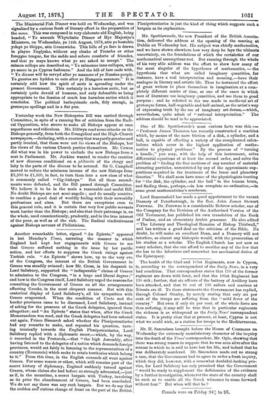Another remarkable letter, signed "An Epirote," appeared in last Monday's
Times, narrating the manner in which England had kept her engagements with Greece to see that Greece suffered nothing in the issue by her pacific action, and her efforts to suppress the Greek risings against Turkish rule. "An Epirote" shows how, up to the very eve of the Congress, the interest of the British Government in Greece was steadily evinced ; how Mr. Cross, in his despatch to Lord Salisbury, supported the " indisputable " claims of Greece to admission to the Congress, "in a large and liberal degree ;" and how in the Congress itself, Lord Salisbury urged the reasons for consulting the Government of Greece on all the arrangements affecting Greeks, in the most eloquent manner. But with this oratorical display of Lord Salisbury's, all his sympathies with Greece evaporated. When the condition of Crete and the border provinces came to be discussed, Lord Salisbury, instead of asking for the presence of the Greek delegates, ignored them altogether; and "An Epirote" states that when, after the Greek Memorandum was read, and the Greek delegates had been ushered out again, Prince Bismarck asked whether the Plenipotentiaries had any remarks to make, and repeated his question, turn- ing ironically towards the English Plenipotentiaries, Lord Salisbury replied with a diplomatic sneer,—which, by the way, is recorded in the Protocols,—that "the high Assembly, after having listened to the delegates of a nation which demands foreign provinces, would act fairly in listening to the representatives of a country (Roumania) which seeks to retain territories which belong to it." From this time, in the English counsels all went against Greece. For some reason or other, which still remains part of the secret history of diplomacy, England suddenly turned against Greece, whose claims she had before so strongly advocated,—just as if, in the meantime, a secret bargain with Turkey, involving as its price the abandonment of Greece, had been concluded. We do not say there was any such bargain. But we do say that the sudden and curious change of front on the part of the British
Plenipotentiaries is just the kind of thing which suggests such a bargain as its explanation.






























 Previous page
Previous page